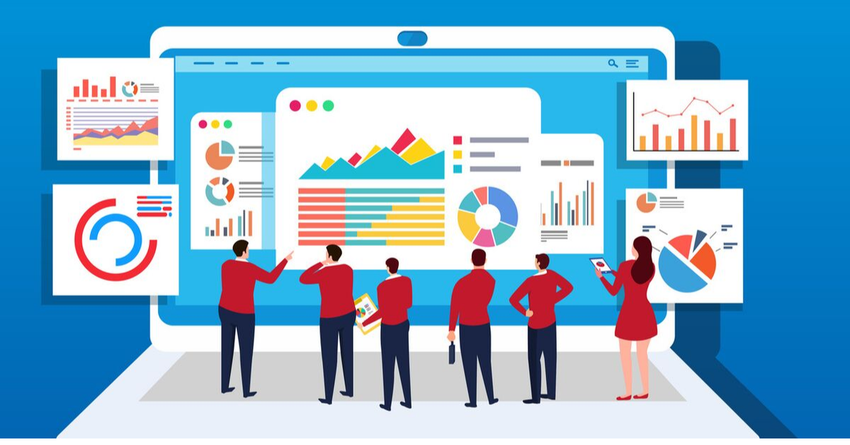Data-driven marketing has evolved from an innovative approach. It has customers looking for more of a personalized experience instead of the days of measuring bounce rates and cost per clicks. It has become a fundamental part of advertising. The data-driven marketing approach works best when combined with a clear and effective IT strategy (learn more here).
Marketing through data referred to strategies built on insights and pulled from analysis, collected through consumer interactions and engagements.
Businesses and customers can achieve a lot from taking a data-driven marketing approach and received help in there data marketing strategies from companies, such as Boost Labs. The goal of data marketing is to enhance and personalize the customer experience. Here are five ways to use data in your marketing strategy:
Page Contents
1. Customer Purchasing Habits

source:smallbiztrends.com
Before analyzing data and developing a marketing strategy, you need to have insight into your customers’ behavior. Knowledge about your consumers, buying habits can help you establish your marketing strategy because knowing how your customers relate with your products or services can help you gain an understanding of how your business is performing.
But even the best leads mean nothing if they aren’t converted. Careful analyses of customer data can have a major impact on lead generation conversion rates, which is the most important metric when it comes to lead generation. Every increase in conversion rates directly contributes to sales. This analysis has several steps.
It usually starts with a review of closed deals. This can tell us what has worked in the past and is a sound starting point for future activities. Next comes the review of new leads, which will help us determine lead sources, as well as the quality of those leads. Finally, we look for opportunities to optimize both lead sources and lead conversion rates.
2. Lead Generation and Profit

source:valuewalk.co
You want to assess the most crucial area that your revenues are coming from. Is your lead generation coming from your social media channels or search engines? It would help if you determined the best keywords to drive your target customers to your website and social media channels.
It is impossible to run a successful lead nurturing process without the appropriate data that will guide you on the way. This way you are robbing yourself of one of the most important tools in your arsenal, personalization. It is a key to any future marketing strategy and lead nurturing will set up the base for any interaction down the road and through the sales funnel. The effect this has on the bottom line is amazing and people who didn’t have an opportunity to see it are astonished by it.
3. Personalized Lead Nurturing
A data-driven marketing strategy permits for a more personalized process. It helps you better understand the target audience and their buying cycle. Putting time into nurturing customers through segmentation and communication only works if you are cultivating and collecting the appropriate data correctly. Without relevant information, you will run into problems.
4. Tailored Campaigns

source:facebook.com
The content you are putting in front of the customers needs to be of value to your target audience. That is where data can help with your marketing campaign, and it can help you fine-tune your message so that you are reaching your goal. It’s about personalization and assisting potential customers in making them feel that your product or service is what they are looking for.
5. Achieve a Competitive Edge
Data can help you know where you stack up against your competition, its vulnerabilities, and how you can exceed marketing initiatives. It allows you to take a step back and look at the bigger picture and what the customers want. Data-driven marketing helps you personalize your strategy, understand your audience and competitors, and learn keywords that viewers are looking for.

source:kenshoo.de
Data Marketing Benefits
When data marketing strategies are implemented correctly, your company should see these benefits:
- Customized Marketing – you want to get the right message out to the right audience, at the correct time. Data-driven marketing helps brands in creating personalized campaigns to convert leads by understanding your customer’s profile.
- Transparency – marketers can go through the abundance of information in their database to determine the most accurate information about customers and potential customers. Data makes it easier to separate target audiences that you are trying to reach.
- Multi-Channel Involvement – marketers can leverage data to extend across multiple networks and take communications beyond email. Delivering data-driven marketing ads across various channels will ensure your message remains consistent and reaches targets at the perfect place and time.
Data-Driven Marketing Approach
If you are getting started or looking to improve your marketing strategy, specific tools need to be considered in your data marketing, such as automate and integrate, collaboration across teams, monitoring changes in the industry, continually measuring analytics
Final Thoughts

source:digitalmarketinginstitute.com
Data-driven marketing is becoming a crucial part of successful marketing campaigns due to the advancing needs of customers and their expectations for more personal experiences. It is often described as the future of marketing. With Big Data on the rise, the marketers’ ability to access customer data is unprecedented and will continue to grow. This treasure trove of data requires a new approaching in order to be fully utilized.
The concept itself is relatively simple and mainly revolves around the strategies that are already in use in big data companies. The key component is understating data and using it to predict future behavior. Based on customers’ previous purchases and interactions, the task is an easy one, provided the company possesses the expertise to pull it off.
The know-how for organizing, analyzing, and applying data is not a rare skill among marketers, but to fully embrace data-driven marketing, it needs to be dial upped a notch. The end goal is to provide a personalized experience for customers, which directly translates into increased sales.
The best way to achieve this goal is through content that will resonate with customers by making it as personal as possible, increasing their engagement. The process can be tedious and time-consuming, but the results are well worth the effort and investment.





